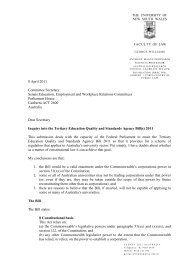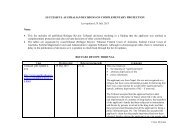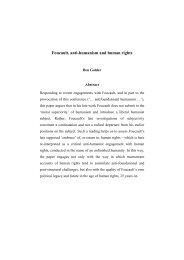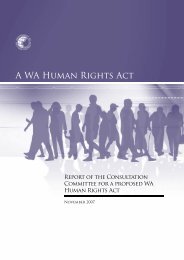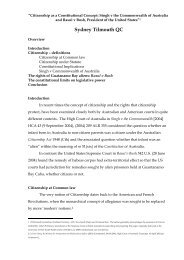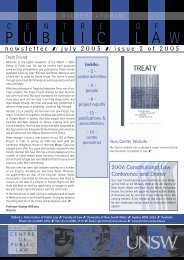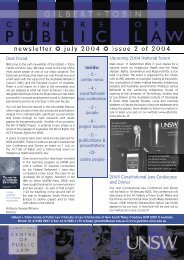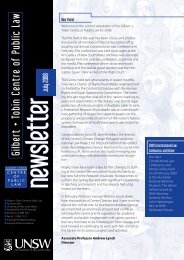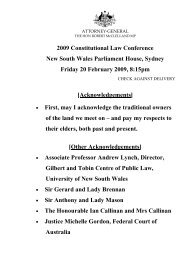Citizenship as a Constitutinal Concept - Gilbert + Tobin Centre of ...
Citizenship as a Constitutinal Concept - Gilbert + Tobin Centre of ...
Citizenship as a Constitutinal Concept - Gilbert + Tobin Centre of ...
Create successful ePaper yourself
Turn your PDF publications into a flip-book with our unique Google optimized e-Paper software.
CITIZENSHIP AS A CONSTITUTIONAL CONCEPT; THE PAST AND THE<br />
FUTURE.<br />
Kim Rubenstein, Senior Lecturer in Law, University <strong>of</strong> Melbourne<br />
(This paper draws from my forthcoming book, Australian <strong>Citizenship</strong> Law in<br />
Context, 2002 Lawbook Company). Any citation from this paper must be with the<br />
permission <strong>of</strong> the author, k.rubenstein@law.unimelb.edu.au)<br />
“<strong>Citizenship</strong>”, <strong>as</strong> Gaudron J states in Chu Kheng Lim v Minister for Immigration, Local<br />
Government and Ethnic Affairs (Lim) (1992) 176 CLR 1 at 54, is not a constitutional term<br />
at all:<br />
“<strong>Citizenship</strong>, so far <strong>as</strong> this country is concerned, is a concept which is entirely<br />
statutory, originating <strong>as</strong> recently <strong>as</strong> 1948 … It is a concept which is and can be<br />
pressed into service for a number <strong>of</strong> constitutional purposes … But it is not a<br />
concept which is constitutionally necessary, which is immutable or which h<strong>as</strong><br />
some immutable core element ensuring its l<strong>as</strong>ting relevance for constitutional<br />
purposes.” 1<br />
Indeed, the term w<strong>as</strong> deliberately omitted from the Australian Constitution. 2 While John<br />
Quick w<strong>as</strong> keen to include a reference to national citizenship, Isaac Isaacs successfully<br />
pressed for its omission. 3 Kirby J explains in DJL v Central Authority (2000) 201 CLR<br />
226 at 277-278 (references omitted):<br />
“The Australian Constitution does not refer to the status <strong>of</strong> ‘citizen’ in relation to<br />
native born or naturalized people <strong>of</strong> the Commonwealth. The ‘people’ are referred<br />
to in several places. Elsewhere the people who are entitled to vote are described<br />
<strong>as</strong> ‘electors’. In harmony with the notions <strong>of</strong> the time, the Constitution refers to<br />
the national status <strong>of</strong> Australians <strong>as</strong> that <strong>of</strong> ‘a subject <strong>of</strong> the Queen’. This h<strong>as</strong> been<br />
construed, in contemporary circumstances, to be equivalent to a reference to<br />
Australian citizenship.”<br />
While some <strong>of</strong> these statements are arguable, 4 there is no doubt in my view that the<br />
absence <strong>of</strong> any explicit use <strong>of</strong> the term “citizen” h<strong>as</strong> been a constraining factor in the<br />
High Court’s approach to Australian citizenship.<br />
This is not to deny the constitutional importance <strong>of</strong> a person’s “civil status” 5 . In fact,<br />
Gaudron J w<strong>as</strong> at pains to point out (in overriding the decision <strong>of</strong> Nolan v Minister for<br />
Immigration and Ethnic Affairs (1988) 165 CLR 178) in Re Patterson; Ex parte Taylor<br />
1<br />
2<br />
3<br />
4<br />
5<br />
This is the same in Canada. See Solis v Canada (Minister for <strong>Citizenship</strong> and Immigration) (2000) 186 DLR(4th) 512 where the Federal Court <strong>of</strong><br />
Appeal determined that the concept <strong>of</strong> citizenship h<strong>as</strong> no meaning apart from statute. The applicant had argued that notwithstanding he w<strong>as</strong> not a<br />
citizen under the <strong>Citizenship</strong> Act RSC 1985, he had an independent charter-b<strong>as</strong>ed right to be considered a citizen largely because <strong>of</strong> his family ties<br />
and roots in Canada. An application for leave to appeal to the Supreme Court <strong>of</strong> Canada w<strong>as</strong> dismissed on 23 November 2000 without re<strong>as</strong>ons<br />
(Court File No 27947).<br />
As discussed in greater detail in Kim Rubenstein, Australian <strong>Citizenship</strong> Law in Context (LawBook Co, 2002) Chapter 2.<br />
Ibid at [2.3.2.2].<br />
And indeed are addressed further below.<br />
This is the term used by Gummow and Hayne JJ in their joint judgment in Re Patterson; Ex parte Taylor at [141], (2000) 75 ALJR 1439 at 1465.
[2001] HCA 51; (2001) 75 ALJR 1439 that “there could hardly be an issue <strong>of</strong> more<br />
fundamental importance than that <strong>of</strong> a person’s constitutional status”. 6 However, the<br />
constitutional status being discussed w<strong>as</strong> “alien” rather than “citizen”.<br />
In my 20 minutes today, I will briefly take you to some important High Court decisions<br />
that shed light on citizenship and its constitutional implications.<br />
Section 44 <strong>of</strong> the Constitution and citizenship<br />
There have been various constitutional questions prompting the court to discuss<br />
citizenship. Section 44 <strong>of</strong> the Constitution provides the court with one context since the<br />
only reference to “citizen” is “citizen <strong>of</strong> a foreign power” and the disqualification <strong>of</strong><br />
people who are citizens <strong>of</strong> a foreign power from membership <strong>of</strong> the Parliament. The<br />
meaning <strong>of</strong> “citizenship” w<strong>as</strong> examined in Sue v Hill (1999) 199 CLR 462, with Senatorelect<br />
Heather Hill disqualified from her parliamentary position. The High Court found<br />
Hill ineligible for election <strong>as</strong> she w<strong>as</strong> a British citizen at the time <strong>of</strong> her nomination and<br />
Britain w<strong>as</strong> a foreign power for the purpose <strong>of</strong> s 44. The new status <strong>of</strong> Australian citizen<br />
had played a part in that development.<br />
In Sue v Hill, Gaudron J identified the change in the meaning <strong>of</strong> the status <strong>of</strong> “British<br />
subject” in the transformation <strong>of</strong> the relationship between the United Kingdom and<br />
Australia. 7 It w<strong>as</strong> highlighted by Gaudron J that British subjects became citizens <strong>of</strong> the<br />
independent nation-states into which the British Empire w<strong>as</strong> transformed. Furthermore,<br />
the removal <strong>of</strong> the British subject status by amendment to the legislation in 1984, taking<br />
effect in 1987, meant that from that time on Australians were solely Australian citizens.<br />
As Gaudron J stated (at 528):<br />
“That process, both in this country and the United Kingdom, renders the<br />
constitutional references to ‘a subject <strong>of</strong> the Queen’ <strong>of</strong> little or no significance in<br />
determining whether the United Kingdom is now a foreign power”.<br />
Thus, the introduction <strong>of</strong> citizenship <strong>as</strong> “legal status” is viewed by the court <strong>as</strong> a<br />
fundamental step in Australia’s independence <strong>as</strong> a nation, bestowing upon citizenship an<br />
important republican dimension.<br />
In an interesting contr<strong>as</strong>t, however, the court found that the constitutional references to “a<br />
subject <strong>of</strong> the Queen” were still significant in determining whether British subjects<br />
resident in Australia at the time <strong>of</strong> the legislative removal <strong>of</strong> the status were “aliens” for<br />
the purposes <strong>of</strong> s 51(xix) <strong>of</strong> the Constitution, in determining Parliament’s power to deport<br />
aliens under the Migration Act 1958. In Re Patterson; Ex parte Taylor [2001] HCA 51,<br />
the court confirmed the constitutional capacity for dual citizenship by stating that “[a]<br />
person is not necessarily excluded from membership <strong>of</strong> the Australian community by<br />
re<strong>as</strong>on <strong>of</strong> his or her being a citizen <strong>of</strong> a foreign power”. 8 However, while one can be a<br />
dual citizen, dual citizens can not nominate to stand <strong>as</strong> a member <strong>of</strong> Parliament. British<br />
6<br />
7<br />
8<br />
Ibid at [40], (2000) 75 ALJR 1439 at 1448.<br />
(1999) 199 CLR 462 at 527, fn 228. See also discussion <strong>of</strong> this in Chapter 3 at [3.2].<br />
Ibid, Gaudron J at [34].
subjects resident in Australia in 1987 have a special constitutional cl<strong>as</strong>s <strong>as</strong> they are<br />
citizens <strong>of</strong> a foreign power, can vote in Federal and State elections if on the electoral roll<br />
and are not aliens <strong>of</strong> Australia and can not be deported.<br />
Section 117 <strong>of</strong> the Constitution and citizenship 9<br />
The Court’s closest attempt at discussing membership <strong>of</strong> the Australian community in a<br />
constitutional context h<strong>as</strong> been in considering s 117, which demands:<br />
“A subject <strong>of</strong> the Queen, resident in any State, shall not be subject in any other<br />
State to any disability or discrimination which would not be applicable to him if<br />
he were a subject <strong>of</strong> the Queen resident in each other State.”<br />
I use the term membership <strong>of</strong> the community in contr<strong>as</strong>t to citizenship to highlight that<br />
there is <strong>of</strong>ten a difference between the legal notion <strong>of</strong> membership and broader<br />
community understandings <strong>of</strong> membership. In Street v Queensland Bar Association<br />
(1989) 168 CLR 461, the court broadened its interpretation <strong>of</strong> s 117 by dropping clues <strong>as</strong><br />
to its view <strong>of</strong> citizenship <strong>as</strong> membership.<br />
M<strong>as</strong>on CJ saw s 117 <strong>as</strong> designed to enhance “national unity and a real sense <strong>of</strong> national<br />
identity” (at 485) while not directly discussing the meaning <strong>of</strong> “citizenship”. Brennan J<br />
deemed it unnecessary to determine whether the term is synonymous with “Australian<br />
citizen”, and referred to the Convention Debates where the term w<strong>as</strong> consciously left<br />
open (at 505). However, Deane J made explicit use <strong>of</strong> the term “citizen”, stating (at 522)<br />
that the operation <strong>of</strong> s 117 is to “protect the citizen resident in one State from being<br />
subjected in another State to ‘disability or discrimination’ ”. More fundamentally, the<br />
section is, in his view, directed to the “promotion <strong>of</strong> national economic and social<br />
cohesion and the establishment <strong>of</strong> a national citizenship” (at 522). Thus, Deane J sought<br />
to use s 117 to influence the shape <strong>of</strong> Australian citizenship. The equation <strong>of</strong> citizenship<br />
and equality w<strong>as</strong> also a theme <strong>of</strong> Dawson J, who (at 541) viewed s 117 <strong>as</strong> ensuring that<br />
persons from one State are treated in another “<strong>as</strong> citizens <strong>of</strong> the one nation, not <strong>as</strong><br />
foreigners”.<br />
What w<strong>as</strong> not resolved in this c<strong>as</strong>e is very important in determining the breadth <strong>of</strong><br />
citizenship. “Whether a person living in Australia, but not a natural born or naturalized<br />
Australian citizen, is entitled to the protection accorded by s 117 is a matter to be<br />
considered when the occ<strong>as</strong>ion arises”, Toohey J stated (at 554). This w<strong>as</strong> considered by<br />
McHugh J in Re Patterson; Ex parte Taylor [2001] HCA 51, 10 a c<strong>as</strong>e which revisited the<br />
meaning <strong>of</strong> “alien” in s 51(xix) <strong>of</strong> the Constitution. 11 McHugh J w<strong>as</strong> <strong>of</strong> the view that<br />
“subject <strong>of</strong> the Queen” in s 117 h<strong>as</strong> evolved to mean “subject <strong>of</strong> the Queen <strong>of</strong> Australia”<br />
(at [131]). And once one accepted that a particular person w<strong>as</strong> a “subject <strong>of</strong> the Queen <strong>of</strong><br />
Australia”, they were deserving <strong>of</strong> s 117 protection. McHugh J stated (at [132] that:<br />
9<br />
10<br />
11<br />
For broader discussions about s 117, see Lee and Paterson, “Australian Nationhood in the Constitutional Interpretation <strong>of</strong> Section 117” (2000) 8 Asia<br />
Pacific Law Review 169; Mathieson, “Section 117 <strong>of</strong> the Constitution: The Unfinished Rehabilitation” (1999) 27 Federal Law Review 393 and<br />
Ebbeck, “The Future for Section 117 <strong>as</strong> a Constitutional Guarantee” (1993) 4 Public Law Review 89 and “Section 117: The Obscure Provision”<br />
(1991) 13 Adelaide Law Review 23.<br />
Decision 6 September 2001.<br />
See immediately below.
“It is not a question <strong>of</strong> Australian citizenship — a term that the Constitution does<br />
not use — but <strong>of</strong> the distinction that the Constitution draws between a subject <strong>of</strong><br />
the Queen and one who is not, that is to say, an alien.”<br />
Those British subjects, born in the United Kingdom, who were living in Australia at the<br />
commencement <strong>of</strong> the Royal Style and Titles Act 1973 (Cth) became, in McHugh’s view,<br />
subjects <strong>of</strong> the Queen <strong>of</strong> Australia <strong>as</strong> well <strong>as</strong> subjects <strong>of</strong> the Queen <strong>of</strong> the United<br />
Kingdom, and were therefore protected by s 117. 12 Thus, Australian citizens and British<br />
subjects who are also subjects <strong>of</strong> the Queen <strong>of</strong> Australia are protected by s 117, creating a<br />
larger group <strong>of</strong> people deemed to be within the boundaries <strong>of</strong> membership <strong>of</strong> the<br />
Australian community. An even greater group <strong>of</strong> persons could still try to come within<br />
the protection <strong>of</strong> s 117: those who are permanent residents <strong>of</strong> Australia. If this question is<br />
brought before the court in the future, it will have to consider the difference between the<br />
legal status <strong>of</strong> citizen, permanent resident and temporary resident, which will involve<br />
considerations similar to the discussions in Potter v Minahan (1908) 7 CLR 277, 13 and<br />
the broader notion <strong>of</strong> who is regarded <strong>as</strong> a member <strong>of</strong> the Australian community. 14<br />
Section 51(xix) and citizenship<br />
The court h<strong>as</strong> dealt with the consequences <strong>of</strong> citizenship most directly in immigration and<br />
deportation c<strong>as</strong>es. 15 Aliens are subject to Commonwealth control by virtue <strong>of</strong> s 51(xix) <strong>of</strong><br />
the Constitution, which refers to “naturalization and aliens”. This head <strong>of</strong> power h<strong>as</strong> been<br />
used by the government, and h<strong>as</strong> been interpreted by the High Court, to give the<br />
Commonwealth almost complete control 16 over laws relating to aliens. The power is<br />
plenary. 17 The regulation <strong>of</strong> immigration through this power 18 is the clearest expression<br />
<strong>of</strong> membership <strong>of</strong> the community since it practically determines who in fact is present<br />
within the country 19 and maintains control over those people who do not take up<br />
Australian citizenship. 20<br />
One <strong>of</strong> the most dramatic c<strong>as</strong>es to display the government’s power over non-citizens and<br />
the different legal rights <strong>of</strong> citizens and non-citizens is Lim v Minister for Immigration,<br />
Local Government and Ethnic Affairs (1992) 176 CLR 1. The court upheld the power <strong>of</strong><br />
the executive under the Migration Act 1958 (Cth) 21 to detain an alien held in custody for<br />
the purposes <strong>of</strong> expulsion or deportation. Such authority constituted an incident <strong>of</strong><br />
executive power. 22 This w<strong>as</strong> not entirely surprising, <strong>as</strong> it had long been upheld by the<br />
12<br />
13<br />
14<br />
15<br />
16<br />
17<br />
18<br />
19<br />
20<br />
21<br />
22<br />
Indeed, they were not aliens for the purpose <strong>of</strong> the Constitution, <strong>as</strong> discussed below.<br />
See discussion in Rubenstein, ibid. Chapter 3 at [3.3].<br />
Barwick CJ’s discussion <strong>of</strong> s 117 in Henry v Boehm (1973) 128 CLR 482 at 487 identifies permanent residence <strong>as</strong> a factor in determining who is<br />
covered by s 117. See also Pannam, “Discrimination on the B<strong>as</strong>is <strong>of</strong> State Residence in Australia and the United States” (1967) 6 Melbourne<br />
University Law Review 105.<br />
As discussed in more detail in Rubenstein, Chapter 3 at [3.3]. Since the Migration Act 1958 (Cth) w<strong>as</strong> amended, restricting judicial review rights <strong>of</strong><br />
non-citizens, there are more c<strong>as</strong>es reviewing decisions under the Migration Act 1958 (Cth) where the High Court is exercising its original<br />
jurisdiction. This h<strong>as</strong> incre<strong>as</strong>ed the appearance <strong>of</strong> the word “citizen” in High Court judgments.<br />
While this is a plenary power, the Commonwealth Government is still restricted by other notions protected by the Constitution, such <strong>as</strong> separation <strong>of</strong><br />
powers and responsible government.<br />
See McHugh J in Re Patterson; Ex parte Taylor [2001] HCA 51 at [99], (2001) 75 ALJR 1439 at 1457.<br />
As opposed to s 51(xxvii) “immigration and emigration”.<br />
The executive’s power to control entry into the country w<strong>as</strong> clearly established by the High Court in Robtelmes v Brenan (1906) 4 CLR 395. As<br />
Catherine Dauvergne argues, migration law is more important than citizenship law for the question <strong>of</strong> who can become an Australian citizen:<br />
Dauvergne, “Confronting Chaos: Migration Law Responds to Images <strong>of</strong> Disorder” (1999) 5 Res Publica 23 and “<strong>Citizenship</strong>, Migration Laws and<br />
Women: Gendering Permanent Residency Statistics” (2000) 24 Melbourne University Law Review 280.<br />
Note, however, the discussion below about the special status accorded to non-citizen British subjects.<br />
Sections 54L and 54N <strong>as</strong> they then were.<br />
Lim (1992) 176 CLR 1 at 10 (M<strong>as</strong>on CJ); at 32 (Brennan, Deane and Dawson JJ); at 47 (Toohey J); at 58 (Gaudron J) and at 64 (McHugh J).
Australian courts <strong>as</strong> a necessary consequence <strong>of</strong> the power to deport. An earlier decision<br />
referred to in Lim w<strong>as</strong> Koo Wing Lau v Calwell (1949) 80 CLR 533, which w<strong>as</strong> a<br />
Wartime Refugees Removal Act 1949 (Cth) c<strong>as</strong>e dealing with the deportation <strong>of</strong><br />
prescribed persons. 23 However, the court clearly acknowledged that administrative<br />
detention <strong>of</strong> citizens would be unconstitutional:<br />
“It would … be beyond the legislative power <strong>of</strong> the Parliament to invest the<br />
Executive with an arbitrary power to detain citizens in custody … the involuntary<br />
detention <strong>of</strong> a citizen in custody by the State is penal or punitive in character and,<br />
under our system <strong>of</strong> government, exists only <strong>as</strong> an incident <strong>of</strong> the exclusively<br />
judicial function <strong>of</strong> adjudging and punishing criminal guilt.” 24<br />
This highlights a fundamental difference in the rights <strong>of</strong> citizens and non-citizens. 25<br />
The definition <strong>of</strong> “aliens” in s 51(xix) <strong>of</strong> the Constitution h<strong>as</strong> been considered by the<br />
High Court because <strong>of</strong> the changed relationship between Australia and England and the<br />
common heritage <strong>of</strong> being “British subjects”. In several c<strong>as</strong>es, non-citizens who were<br />
about to be deported under the Migration Act 1958 (Cth), sought to prevent their<br />
deportation by arguing over the constitutional definition <strong>of</strong> “aliens” because <strong>of</strong> their<br />
British subject status. 26<br />
In Pochi v Macphee (1982) 151 CLR 101, the High Court confirmed that the power to<br />
define the meaning <strong>of</strong> “aliens” is in Australian hands and denied that English law<br />
governed the question. As Gibbs CJ pointed out (at 109):<br />
“If English law governed the question who are aliens within s 51(xix) almost all<br />
Australians born in Australia would in future be aliens within that provision. The<br />
absurdity <strong>of</strong> such a result would be manifest.” 27<br />
In an obiter statement, Gibbs CJ also stated (at 109-110) that aliens were “person[s] born<br />
outside Australia whose parents were not Australian and who [have] not been naturalized<br />
<strong>as</strong> an Australian”. The majority in Nolan v Minister for Immigration and Ethnic Affairs<br />
(Nolan) (1988) 165 CLR 178 confirmed Gibbs CJ’s definition <strong>of</strong> an “alien” and added<br />
persons who have “ce<strong>as</strong>ed to be a citizen by an act or process <strong>of</strong> denaturalization and<br />
restricted to exclude a person who, while born abroad, is a citizen by re<strong>as</strong>on <strong>of</strong><br />
parentage”. 28 Gaudron J, who dissented, defined an “alien” <strong>as</strong> (at 189):<br />
“… [A] person who is not a member <strong>of</strong> the community which constitutes the body<br />
23<br />
24<br />
25<br />
26<br />
27<br />
28<br />
See discussion <strong>of</strong> Brennan, Deane and Dawson JJ in Lim (1992) 176 CLR 1 at 31. For a critique <strong>of</strong> this approach, see Crock, “Climbing Jacob’s Ladder:<br />
The High Court and the Administrative Detention <strong>of</strong> Asylum Seekers in Australia” (1993) 15 Sydney Law Review 338 at 349.<br />
Lim (1992) 176 CLR 1 at 27 (Brennan, Deane and Dawson JJ). Note there are some qualifications to this general proposition, such <strong>as</strong> the power to<br />
detain citizens for the purpose <strong>of</strong> arrest and warrant and in c<strong>as</strong>es <strong>of</strong> mental illness or infectious dise<strong>as</strong>e: Lim at 28-29 (Brennan, Deane and Dawson<br />
JJ).<br />
The extent <strong>of</strong> the executive’s power over non-citizens h<strong>as</strong> also been raised in a Federal Court matter. In Victorian Council for Civil Liberties<br />
Incorporated v Minister for Immigration and Multicultural Affairs [2001] FCA 1297 (11 September 2001), North J held that <strong>as</strong>ylum seekers aboard<br />
the MV Tampa were unlawfully detained by the executive. In Ruddock v Vadarlis [2001] FCA 1329 (18 September 2001), the Full Court by a 2-1<br />
majority overturned North J’s decision and held that the Commonwealth w<strong>as</strong> acting within its executive power under s 61 <strong>of</strong> the Constitution in the<br />
steps it took to prevent the landing <strong>of</strong> the <strong>as</strong>ylum seekers. An application for special leave to appeal this decision is pending in the High Court <strong>of</strong><br />
Australia: Vadarlis v Minister for Immigration and Multicultural Affairs (M93 <strong>of</strong> 2001).<br />
These c<strong>as</strong>es involved a range <strong>of</strong> arguments linked to British subject status. This material is also covered in Chapter 4 in the discussion on “British<br />
subject” at [4.1.1.2] and [4.3].<br />
. This w<strong>as</strong> affirmed in Nolan v Minister for Immigration and Ethnic Affairs (1988) 165 CLR 178. See especially at 189 (Gaudron J).<br />
Ibid at 183.
politic <strong>of</strong> the nation state … For most purposes it is convenient to identify an alien<br />
by reference to the want or absence <strong>of</strong> the criterion which determines membership<br />
<strong>of</strong> that community. Thus, where membership <strong>of</strong> a community depends on<br />
citizenship, alien status corresponds with non-citizenship; in the c<strong>as</strong>e <strong>of</strong> a<br />
community whose membership is conditional upon allegiance to a monarch, the<br />
status <strong>of</strong> an alien corresponds with the absence <strong>of</strong> that allegiance.”<br />
Gaudron J’s dissent became part <strong>of</strong> the majority in overturning the decision <strong>of</strong> Nolan<br />
regarding the definition <strong>of</strong> “aliens” in Re Patterson; Ex parte Taylor (Patterson) [2001]<br />
HCA 51, (2001) 75 ALJR 1439. 29 The majority <strong>of</strong> the court in Patterson confirmed the<br />
view expressed in Nolan that the definition <strong>of</strong> “alien” in the Australian <strong>Citizenship</strong> Act<br />
1958 (Cth) did not “confine the meaning or denotation <strong>of</strong> the word in s 51(xix) <strong>of</strong> the<br />
Constitution” 30 and it held that a British subject, in essentially the same position <strong>as</strong><br />
Nolan, 31 w<strong>as</strong> not an alien for the purpose <strong>of</strong> the Constitution and so could not be<br />
deported. This landmark decision formalises a new status <strong>of</strong> persons in Australia —<br />
British subjects who are not constitutional aliens for the purpose <strong>of</strong> s 51(xix). They are<br />
“non-citizen British subjects”. 32 The consequence is that those people cannot be detained<br />
or deported. 33 The effect <strong>of</strong> this decision is substantial for those British subjects who<br />
were residing in Australia at the time <strong>of</strong> the changes to the Australian <strong>Citizenship</strong> Act<br />
1948 (Cth), which removed the status <strong>of</strong> British subject. 34<br />
Thus, the relationship between England and Australia, and Australia’s steps towards<br />
independence <strong>as</strong> a sovereign nation, have complicated the meaning <strong>of</strong> the term “alien”.<br />
As Zines notes, the court’s interpretation <strong>of</strong> terms in the Constitution is not wedded to<br />
their meaning at the time <strong>of</strong> Federation. While the abstract meaning remains constant, the<br />
denotation changes. Thus, in Nolan, while a British subject would not have been an alien<br />
in 1900, the court took into account the “development <strong>of</strong> the independence <strong>of</strong> Australia,<br />
the evolution <strong>of</strong> the Crown from an Imperial to a national <strong>of</strong>fice and the creation <strong>of</strong> a<br />
national citizenship”. 35 Yet the majority in Patterson, while accepting the changes in the<br />
relationship, found that people in Taylor’s situation were in a special category. This w<strong>as</strong><br />
b<strong>as</strong>ed on a range <strong>of</strong> re<strong>as</strong>ons.<br />
In Gaudron J’s view (at [47]), the only change that had occurred for Mr Taylor w<strong>as</strong> an<br />
“evolutionary change in constitutional and governmental thinking with the emergence <strong>of</strong><br />
the notion <strong>of</strong> the divisibility <strong>of</strong> the Crown”. This w<strong>as</strong> not enough to change the<br />
relationship between people in the position <strong>of</strong> Taylor and “the body politic constituting<br />
29<br />
30<br />
31<br />
32<br />
33<br />
34<br />
35<br />
Decision 6 September 2001.<br />
(1988) 165 CLR 178 at 186 per M<strong>as</strong>on CJ, Wilson, Brennan, Deane, Dawson and Toohey JJ.<br />
Taylor arrived in Australia <strong>as</strong> a child in 1966 and h<strong>as</strong> resided in Australia ever since. He h<strong>as</strong> been on the electoral roll since turning 18;, however, he<br />
never applied for Australian citizenship.<br />
Patterson [2001] HCA 51 (6 September 2001) per Kirby J at [261], (2001) 75 ALJR 1439 at 1487-88. See further discussion in Chapter 4 at [4.3].<br />
Note, however, that Gaudron J explains that those people are still within the scope <strong>of</strong> the Migration Act 1958 (Cth) through the s 51(xxvii)<br />
“immigration and emigration” <strong>of</strong> the Constitution and, <strong>as</strong> such, can have their vis<strong>as</strong> cancelled. Where<strong>as</strong>, the other judges in the majority, McHugh,<br />
Kirby,and Callinan JJ, in overturning Nolan upheld the view expressed in Ex parte Walsh and Johnson; In re Yates (1925) 37 CLR 36 that those<br />
persons are also beyond the scope <strong>of</strong> the immigration and emigration power by virtue <strong>of</strong> being absorbed into the community, and therefore they can<br />
not have their vis<strong>as</strong> cancelled either. This distinction in the re<strong>as</strong>oning means that there is no majority view for saying that those British subjects are<br />
beyond the scope <strong>of</strong> the Migration Act 1958 (Cth), except in the c<strong>as</strong>e <strong>of</strong> deportation and detention. See also the discussion in Kim Rubenstein,<br />
above, n2.<br />
See further discussion in Chapter 4 at [4.1.1.2] and [4.3].<br />
Zines, The High Court and the Constitution (4th ed, 1997), p 21. Four members <strong>of</strong> the High Court also confirmed this approach in its interpretation<br />
<strong>of</strong> a “foreign power” in s 44(i) <strong>of</strong> the Constitution in Sue v Hill (1999) 199 CLR 462 at 492 (Gleeson CJ, Gummow and Hayne JJ); at 528<br />
(Gaudron J). The exact point at which British subjects lost their non-alien status w<strong>as</strong> not clarified by the High Court and the later c<strong>as</strong>e <strong>of</strong> Re<br />
Patterson; Ex parte Taylor [2001] HCA 51, (2001) 75 ALJR 1439 found that they have not lost their non-alien status.
the Australian community” (at [48]). 36 In McHugh’s view (at [121]), until the p<strong>as</strong>sing <strong>of</strong><br />
the Royal Style and Titles Act 1973 (Cth), “a person, living in Australia, who owed<br />
allegiance to the Queen <strong>of</strong> the United Kingdom w<strong>as</strong> not and is not an alien within the<br />
meaning <strong>of</strong> the Constitution”. 37 In Kirby J’s view, with whom Callinan J agreed (at<br />
[302]):<br />
The introduction by statute, and then only in 1948, <strong>of</strong> the non-constitutional<br />
notion <strong>of</strong> citizenship scarcely justified the retrospective imposition, on a very<br />
large cl<strong>as</strong>s <strong>of</strong> non-citizen British subjects in Australia, <strong>of</strong> the constitutional status<br />
<strong>of</strong> alien. Such imposition is especially untenable where members <strong>of</strong> that cl<strong>as</strong>s<br />
have long since been absorbed amongst the people <strong>of</strong> the Commonwealth and<br />
accorded by them the full civil and political rights and duties <strong>of</strong> Australian<br />
nationality. 38<br />
Thus, while according to Kirby J the “concept <strong>of</strong> citizenship in Australia h<strong>as</strong> evolved in<br />
harmony with the emergence <strong>of</strong> Australia to full nationhood and independence”, 39 there<br />
h<strong>as</strong> been a special status accorded to non-citizen British subjects by virtue <strong>of</strong> the court’s<br />
definition <strong>of</strong> “alien” in the Constitution, enlarging the Australian body politic.<br />
Section 51 (xxvvii) “Immigration and emigration”<br />
Section 51(xxvii) is also relevant to the determination <strong>of</strong> citizenship. Regulating who<br />
enters the country impacts upon who can apply for citizenship. 40 Gummow J, when a<br />
member <strong>of</strong> the Federal Court, emph<strong>as</strong>ised that:<br />
“[T]he placing in the hands <strong>of</strong> the Parliament <strong>of</strong> the Commonwealth <strong>of</strong> a power<br />
with respect to immigration and emigration ... w<strong>as</strong> done with the avowed purpose<br />
<strong>of</strong> conferring a power <strong>of</strong> exclusion <strong>of</strong> British subjects not born or naturalized in<br />
Australia”. 41<br />
This point is relevant to Gaudron J’s re<strong>as</strong>oning in Re Patterson; Ex parte Taylor (2001)<br />
75 ALJR 1439. While in the majority in overturning Nolan and finding that Taylor could<br />
not be deported or detained by virtue <strong>of</strong> not being an alien, Gaudron J states (at [54])<br />
rather obtusely in one paragraph <strong>of</strong> her judgment:<br />
“Although the power to legislate with respect to immigration does not extend to<br />
laws for the detention and removal <strong>of</strong> persons who have been integrated into the<br />
Australian community, there is no re<strong>as</strong>on, in my view, why that power does not<br />
36<br />
37<br />
38<br />
39<br />
40<br />
41<br />
Note, however, that Gaudron J found that Parliament could in future legislate to define “alien” to include persons who, although not aliens prior to<br />
1987, have since taken action to acknowledge their allegiance to the United Kingdom or to <strong>as</strong>sert their rights and privileges <strong>as</strong> one <strong>of</strong> its citizens” (at<br />
[51]).<br />
Patterson at [121], (2001) 75 ALJR 1439at 1461.<br />
Note that Kirby J also stated in Patterson at [271], (2001) 75 ALJR 1439 at 1490 that attempts “by legislation or regulation, retrospectively, to<br />
convert him from a non-alien to an alien could therefore not succeed. Certainly, they could not succeed without the clearest possible legislation<br />
effecting such a change and provision to him <strong>of</strong> access to a court and due process <strong>of</strong> law to determine the lawfulness <strong>of</strong> the alteration in his particular<br />
c<strong>as</strong>e”.<br />
Ibid at [262], citing Brazil, “Australian Nationality and Immigration”, in Ryan (ed), International Law in Australia (2nd ed, 1984), Chapter 8.<br />
Catherine Dauvergne argues that migration law is more important than citizenship law in deciding who can become an Australian citizen: Dauvergne,<br />
“Confronting Chaos: Migration Law Responds to Images <strong>of</strong> Disorder” (1999) 5 Res Publica 23 and “<strong>Citizenship</strong>, Migration Laws and Women:<br />
Gendering Permanent Residency Statistics” (2000) 24 Melbourne University Law Review 280.<br />
Kenny v Minister for Immigratin and Ethnic Affairs (1993) 42 FCR 330 at 338 where Gummow J cites R v McFarlane: Ex parte O’Flannagan and<br />
O’Kelly (1923) 32 CLR 518 at 557-565 per Isaacs J. See also discussion in Chapter 2.
enable the Parliament to legislate so <strong>as</strong> to provide for the conferral <strong>of</strong> vis<strong>as</strong> on<br />
persons who have migrated to Australia. Nor in my view, is there any re<strong>as</strong>on why,<br />
having legislated to confer vis<strong>as</strong> on such persons, the Parliament cannot legislate<br />
to provide for their cancellation.”<br />
This statement appears to seek to overturn the otherwise accepted view that persons who<br />
have become absorbed into the Australian community are beyond the reach <strong>of</strong> the<br />
immigration and emigration power. In overturning Nolan, the other judges in the<br />
majority, McHugh, Kirby and Callinan JJ, upheld the view expressed in Ex parte Walsh;<br />
Re Yates (1925) 37 CLR 36 42 that those British subjects are also beyond the scope <strong>of</strong> the<br />
immigration and emigration power by virtue <strong>of</strong> being absorbed into the community and,<br />
therefore, they can not have their vis<strong>as</strong> cancelled. This distinction in the re<strong>as</strong>oning means<br />
there is no majority view in Patterson for saying those British subjects are beyond the<br />
scope <strong>of</strong> the Migration Act 1958 (Cth), except in the c<strong>as</strong>e <strong>of</strong> deportation and detention.<br />
Thus, Gaudron J joins with the otherwise minority judges 43 in finding that the Migration<br />
Act 1958 (Cth) still applies to British subjects who were residing in Australia in 1987 and<br />
who have not taken up Australian citizenship, except in the c<strong>as</strong>es <strong>of</strong> detention or<br />
deportation. According to Gaudron J’s view, it would mean those British subjects<br />
voluntarily leave the country can be regulated on their return through a visa or have their<br />
visa cancelled, thus disallowing re-entry. This means they are free to continue to live in<br />
Australia but, in practice, not free to leave.<br />
Conclusion<br />
Controversially, Kirby J argued in DJL v Central Authority (at 278) that “it … seems<br />
likely that further constitutional implications will be derived for the idea <strong>of</strong> citizenship to<br />
which the political institutions established by the Constitution give effect”. 44 However, so<br />
far, the court h<strong>as</strong> had no constitutional foundation for securing the concept <strong>of</strong> citizenship<br />
held out by liberalism, which treats political membership <strong>as</strong> the source <strong>of</strong> protection for<br />
rights. 45 For instance, in the High Court human rights c<strong>as</strong>e, Kruger v Commonwealth (the<br />
Stolen Generations c<strong>as</strong>e) (1997) 190 CLR 1, the plaintiffs’ claims lacked any<br />
constitutional foundation in a concept <strong>of</strong> citizenship. Bereft <strong>of</strong> any <strong>as</strong>pirational statement<br />
about citizenship, and without a bill <strong>of</strong> rights, the Constitution gives no guidance <strong>as</strong> to<br />
which notions <strong>of</strong> citizenship apply, and when.<br />
42<br />
43<br />
44<br />
45<br />
See also discussion in Chapter 3 at [3.3].<br />
That is, Gleeson CJ, Gummow and Hayne JJ, who found that Taylor w<strong>as</strong> an alien and upheld Nolan, thereby enabling the Migration Act 1958 (Cth)<br />
to apply to Taylor.<br />
See also Taylor, “<strong>Citizenship</strong> Rights and the Australian Constitution” (2001) 12 Public Law Review 205. Leslie Zines also discusses the<br />
constitutional implications <strong>of</strong> the sovereignty <strong>of</strong> the people on citizenship in Zines, “The sovereignty <strong>of</strong> the people” in Michael Coper and George<br />
Williams (eds) Power, Parliament and the People (1997) 91 at100.<br />
See discussions in Chapters 1 and 5 about the normative notion <strong>of</strong> citizenship.



